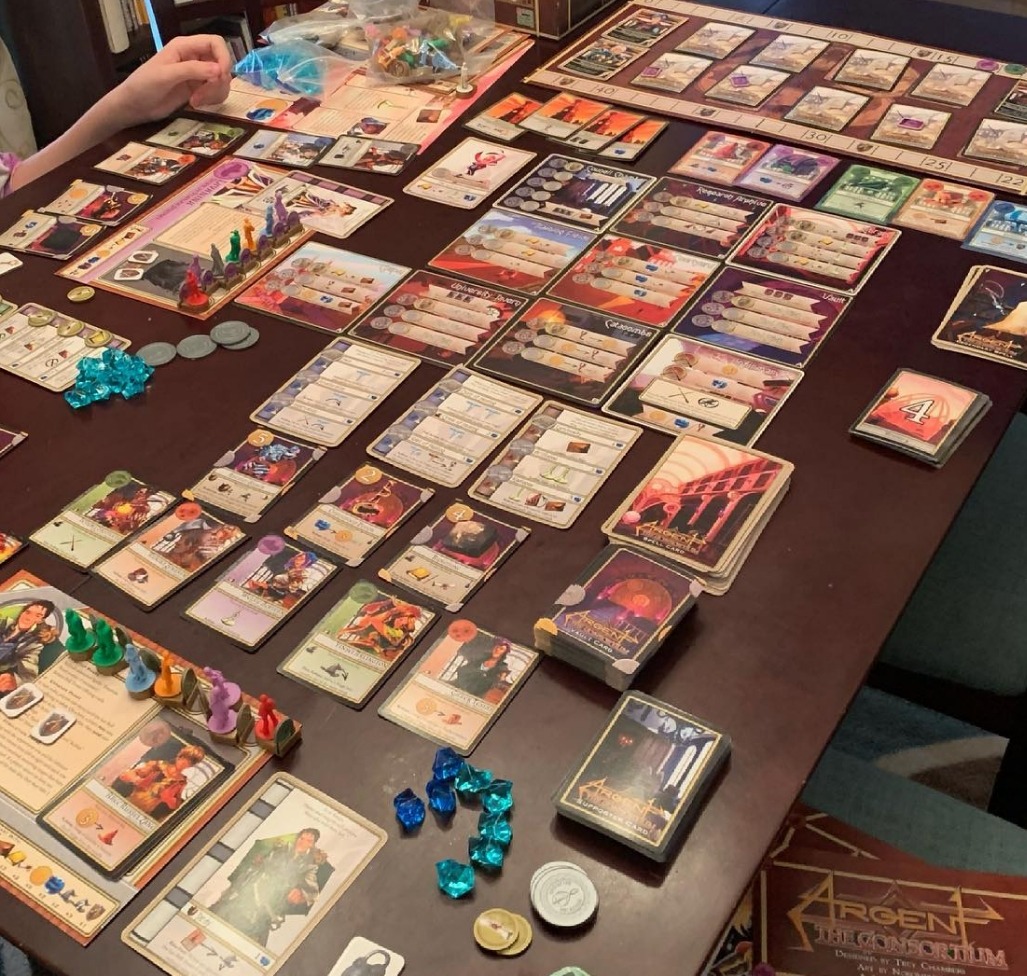Over the past few weeks, I did some unofficial research online, polling gamers on a topic that I find fascinating: What board games are generally considered fantastic but just don’t click with you? The responses were intriguing and diverse, featuring games that are widely loved by the community, yet fail to resonate with certain players.
Here’s a look at the games that were most frequently mentioned:
- Terraforming Mars – Known for its deep strategy and resource management, but some players find it overly complex.
- Catan – A gateway classic, but criticized for its reliance on luck through dice rolls.
- Scythe – Beautiful and sprawling, yet its complex setup can be a barrier.
- Wingspan – Stunning artwork, but the mechanics can feel confusing for some.
- Great Western Trail – Strategically rich, yet players sometimes struggle with the deck-building and movement mechanics.
- 7 Wonders – A fast-paced drafting game, but some find it overwhelming with too many decisions at once.
- Pandemic – The cooperative classic, where the risk of quarterbacking turns some players off.
- Agricola – A worker-placement pioneer, but its punishing gameplay can be too much for some.
- Dominion – The deck-building original, but the random card draws can lead to frustration.
- Magic: The Gathering – The iconic collectible card game, but often criticized for its “pay-to-win” dynamic.
- Ark Nova – A new favorite, but players find the complexity and setup time daunting.
- Small World – Area control with fantasy races, but many feel it grows repetitive after a few plays.
- Galaxy Trucker – A chaotic, real-time ship-building game, but the randomness leaves some feeling powerless.
- It’s a Wonderful World – A fast-paced engine builder, but players struggle with mastering its strategies.
- Paladins of the West Kingdom – A strategic worker-placement game, yet some find its mechanisms difficult to unlock
Digging Deeper: What Do These Games Have in Common?
After seeing this list of games—ranging from the deeply strategic to lighthearted chaos—I started wondering: Is there a reason these well-loved games don’t click with everyone? Could there be some commonalities in their game mechanics, play styles, or themes that explain why some players just don’t enjoy them? It’s not just about whether a game is “good” or “bad,” but how it fits with a player’s personal preferences and gaming group dynamics.
So, I decided to dive into the core mechanics of these games to see if there are any trends that might explain why certain games don’t resonate as widely as we’d expect. I considered how the demands of complexity, randomness, and conflict might be barriers for some. What I found were several common threads that seem to run through these “unpopular” mechanics, and how they can shape a player’s overall experience, for better or worse.
Common Threads in “Unpopular” Mechanics
1. Complexity and Steep Learning Curves
Many of the games on the list, such as Terraforming Mars, Scythe, and Paladins of the West Kingdom, are known for their intricate systems and deep strategies. While this complexity is often the reason these games are praised by serious gamers, it’s also a key reason why they don’t click with everyone.
Games with engine building, resource management, and multiple layers of strategy tend to require significant mental energy. For some, that challenge is part of the fun. But for others, the steep learning curve can feel like a barrier to entry. It’s easy to feel overwhelmed when there are dozens of choices to make, especially if every decision feels high-stakes.
Engine-building games—like Wingspan, It’s a Wonderful World, and Terraforming Mars—in particular require careful planning and coordination over the course of the game. The delayed gratification of engine-building can also be frustrating, as it takes time for the benefits of your choices to become clear.

2. Luck-Based Mechanics
Several games on the list—Catan, Galaxy Trucker, and even Pandemic to some extent—rely heavily on luck. Whether it’s rolling dice, drawing cards, or encountering random events, luck can dramatically influence the outcome of these games.
While randomness can create exciting, unpredictable moments, it can also leave players feeling powerless. In Catan, for example, bad dice rolls can prevent players from collecting resources, completely derailing their strategy. Similarly, in Galaxy Trucker, the random events that occur during space travel can destroy a carefully built ship in an instant. For players who prefer to feel in control of their strategy, these mechanics can feel unfair.

3. High Setup Time and Overhead
Games like Scythe, Ark Nova, and Terraforming Mars are known for their long setup times and component-heavy gameplay. While these games provide a deeply immersive experience, the sheer amount of time and effort required to get the game started can be a turnoff for players who want something quicker and easier to dive into.
Setup time also leads to games feeling like a commitment. For players who prefer shorter, more casual games, this can be a barrier. Even players who enjoy strategic depth might find themselves hesitant to pull these games off the shelf when they know the setup alone could take 20 minutes or more.

4. Direct Conflict and Player Interaction
Some of the games on the list—like Small World, 7 Wonders, and Scythe—involve direct conflict or competition between players. In Small World, players fight for control of territory, using their fantasy races to dominate the board and push opponents out of valuable areas. Similarly, in Scythe, combat and area control are key elements, as players vie for dominance over a dystopian world, where managing military strength is just as important as resource production. Even in a more abstract game like 7 Wonders, players engage in indirect competition by drafting cards that can block opponents’ strategies or shift the balance of power.
For some players, this direct confrontation is thrilling, adding an edge of excitement and unpredictability to every move. The tension of battling for control or outmaneuvering opponents can be a major draw, especially for those who enjoy competitive, high-stakes gameplay. But for others, it feels stressful or even mean-spirited, especially in groups where players prefer more cooperative or passive experiences. In cooperative games like Pandemic, a different kind of frustration arises with quarterbacking—where one player dominates the cooperative strategy, reducing the engagement and agency of other players, making them feel like spectators in their own game.
5. Punishing Gameplay
Games like Agricola and Great Western Trail are known for being punishing if players don’t make the right decisions early on. A bad round in Agricola can leave you scrambling to recover, as failing to feed your family or mismanaging resources can have long-term consequences that are difficult to reverse. Similarly, Great Western Trail often feels like a game where one poor decision—whether it’s a misstep in cattle management or inefficient route planning—can snowball into a game-long struggle, making it hard to catch up with more experienced players.
For players who enjoy a challenge, these unforgiving mechanics are part of the appeal. They offer a sense of accomplishment when navigated successfully, rewarding careful planning and foresight. But for others, they can feel too harsh, especially if a single mistake can derail the entire experience. This can lead to frustration, as players may feel that they have little chance to recover or that their enjoyment is diminished by the constant pressure to play perfectly.
The Subjectivity of Player Tastes
While there are definitely some common threads in the mechanics of these games—such as complexity, luck, setup time, conflict, and punishing difficulty—it’s important to remember that game preferences are incredibly subjective. What one player finds exciting and engaging, another might find overwhelming or frustrating. For example, some people love the tension of managing tight resources and making tough, strategic decisions, while others find that level of pressure unenjoyable. Similarly, games with a lot of direct player conflict might be thrilling for competitive gamers but uncomfortable or stressful for those who prefer more relaxed play.
Some gamers thrive on complexity and love sinking into a game with lots of layers to uncover. Others want something lighter and more straightforward. Some enjoy the slow burn of engine-building games that reward long-term planning, while others prefer fast-paced games that deliver immediate satisfaction. There’s no one-size-fits-all when it comes to board games, and that’s what makes the hobby so diverse and exciting.
At the end of the day, the games that don’t “click” for you might be someone else’s all-time favorite—and that’s perfectly okay! The beauty of board gaming is that there’s a game out there for everyone, whether you love strategic resource management, chaotic dice rolling, or competitive card drafting. And as the industry continues to grow, there’s an ever-expanding variety of games to explore, ensuring that each player can find something that matches their unique taste.
Final Thoughts
While there are some clear commonalities between the games that didn’t resonate with players in my informal poll—complexity, luck, setup time, and direct conflict—ultimately, board gaming is a personal experience. The games that you love might not work for someone else, and vice versa. It’s all about finding the style of play that works best for you. Some players might crave deep strategy and intricate decision-making, while others lean toward fast, light games with quick payoffs.
Similarly, some enjoy the tension of luck-based mechanics, where anything can happen, while others prefer the security of skill-driven gameplay. Group dynamics also play a huge role—what’s fun with one group might feel flat with another. No matter your style, the joy of board gaming comes from exploring different titles and discovering what truly makes you tick as a player.
If you’ve got a game that didn’t click with you but is generally loved by others, don’t worry—you’re not alone. Every gamer has their own unique tastes and goals in gaming, and the right game for you is out there waiting to be discovered.











